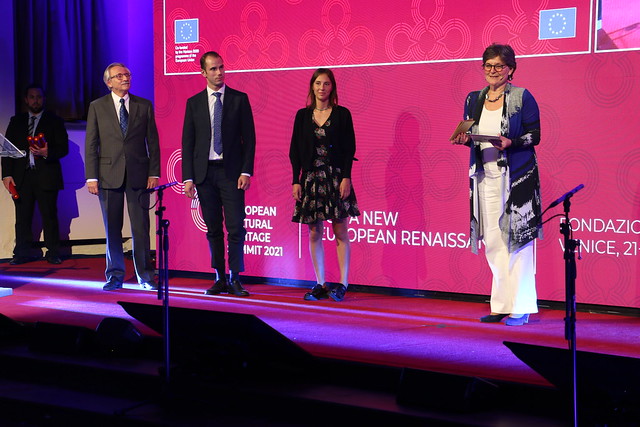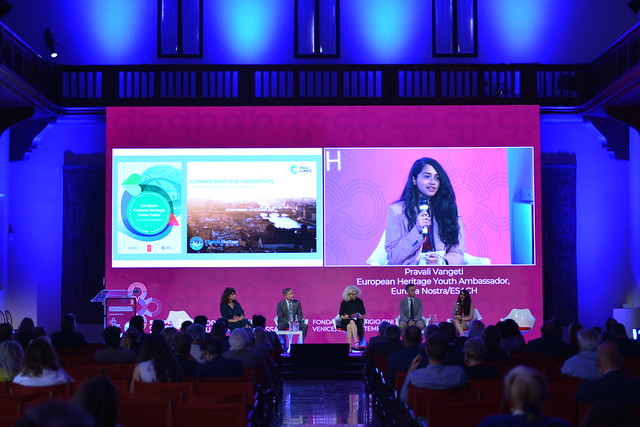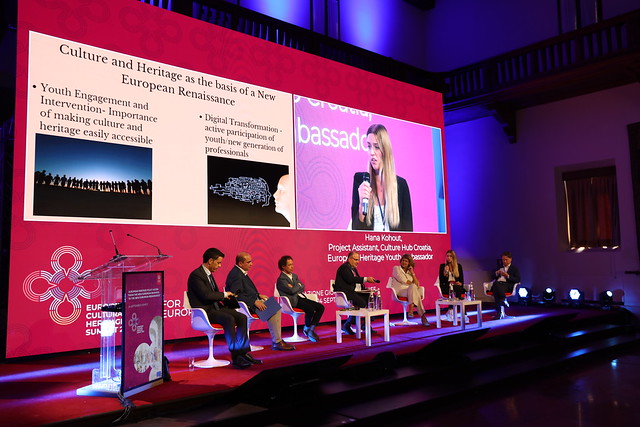European Heritage Youth Ambassadors actively participated in the Summit in Venice
The European Cultural Heritage Summit 2021 took place in Venice on 21-24 September. Eight European Heritage Youth Ambassadors – a joint programme of Europa Nostra, ESACH and the European Heritage Tribune – were specially invited to participate in the Venice Summit with the aim of strengthening intergenerational cooperation and knowledge sharing in the heritage sector. Their active involvement was an inspiration for the future of cultural heritage as an essential part of a more inclusive, just and sustainable Europe.
First in-person encounter in Venice
Eight European Heritage Youth Ambassadors (EHYA) from Spain, Croatia, Romania, Italy, Serbia, France/India and Cyprus attended the Venice Summit. It was their first in-person meeting since the launch of the European Heritage Youth Ambassadors Programme in January 2021, with meetings and activities having taken place online since then. Upon arrival, the EHYA got to learn more about each other’s work and fields of interest while also discovering the mesmerising city of Venice.
On the morning of 23 September, the EHYA held their monthly meeting, during which they discussed ongoing projects, including the cooperation between Europa Nostra and the Erasmus Student Network on the pilot project “Cultural Heritage on Erasmus”. In addition, they have planned their social media posts and how to reach out to more people to spread information about the importance of cultural heritage. Climate action and the protection of vulnerable heritage sites are a passion for many of the youth ambassadors. It was particularly enriching to discuss such topics in Venice, a city deeply affected by climate change and unsustainable tourism.
In order to collectively prepare the youth ambassadors’ interventions at the European Heritage Policy Agora the next day, a workshop was arranged to discuss the relevant topics among the group. The workshop was held at the Giorgio Cini Foundation, located on the island of San Giorgio Maggiore. Discussions revolved around the topics of youth engagement, climate action and heritage for peace-building. All EHYA eagerly contributed with cases and experiences from their academic or work background and country. As a concrete outcome, the youth ambassadors prepared statements for the panelists and agreed on future work and research.
On stage at the European Heritage Awards Ceremony
The European Heritage Awards Ceremony, held on the afternoon of 23 September at the Giorgio Cini Foundation, was one of the highlights of the Venice Summit. High level representatives from the European Commission and Europa Nostra paid tribute to the 2021 laureates of the European Heritage Awards / Europa Nostra Awards – the most impressive accomplishments in conservation, research, dedicated service to heritage, and education, training and awareness-raising from all over Europe.
The European Heritage Youth Ambassadors also played an active role in the Ceremony. Elena Cautis from Romania and Hector Aliaga de Miguel from Spain handed out the Awards diplomas to all the winners, while Giovanni Pescarmona from Italy and Jelena Krivokapic from Serbia were proud to announce the 4 Grand Prix laureates, selected by the Board of Europa Nostra on recommendation by a jury of experts and entitled to receive €10,000 each. Experiencing the commitment and dedication of the Award laureates was surely inspirational for the young heritage professionals.
During the Ceremony, Europa Nostra’s Secretary General Sneška Quaedvlieg-Mihailović highlighted the importance of involving youth and listening to their new ideas. She also underlined Europa Nostra’s commitment to continuing its work on promoting youth engagement: “The youth is not the future of Europe, it is Europe right now,” she stated.
The musical performances by the European Union Youth Orchestra provided a beautiful setting for the whole ceremony and further amplified the focus on youth participation.
Youth Ambassadors participate in the European Heritage Policy Agora
On 24 September, the European Heritage Youth Ambassadors contributed as panelists to the European Heritage Policy Agora “From the New European Bauhaus to the New European Renaissance”. Giving insightful and motivated interventions, they enlightened the different panels with the perspective of young professionals, sharing their views on what is needed to strengthen the heritage sector and better engage the next generation.
Pravali Vangeti from India/France participated in the first panel on “Cultural Heritage at the heart of the European Green Deal”. Pravali talked about the role of youth in bringing about a green transition and the multiple areas of opportunities for youth engagement provided by the European Cultural Heritage Green Paper, as well as the pre-COP26 events planned for the following week by the Climate Heritage Network. She emphasised that climate action ought to be at the heart of all cultural heritage work and that intergenerational cooperation is necessary to create the desired transitions and to reach critical climate goals. While urging politicians and older generations of professionals to mobilise research and entrepreneurship and develop clear guidelines on the skills that are needed, Pravali stressed the importance of including and listening to the next generation of artists, especially when it comes to digital competences. To enhance culture for climate – climate for culture practices, she also suggested conducting a collection of ten key recommendations and goals from young professionals on how they wish to impact future EU policies regarding heritage and climate.
Antigoni Michael from Cyprus participated in the panel “Cultural Heritage, a catalyst for peace and mutual understanding”. As an experienced archeologist and tour guide, Antigone focused on how to use cultural heritage for peace-building work in Cyprus. The armed conflict in Cyprus ended in 1974 but tensions still exist between the Greek-Cypriot and Turkish-Cypriot communities. The ethno-religious identities have created division for centuries, but there is now growing awareness and focus on equal preservation and protection of cultural heritage. Antigone explained that her work focuses on creating mutual respect between the two communities. Regarding youth involvement, Antigone also stressed the importance of overcoming conflict by educating young people on how to think about “the other”. She advocated for putting emphasis on common heritage when working to create social cohesion and healing conflict trauma. This can be done through adaptive reuse and including youth in discussions and the peace-building process. Antigone’s main argument was for the systematic and continuous engagement with cultural heritage and the inclusion and education of young people.
Lastly, Hana Kohout from Croatia participated in the panel about “Culture and Heritage as the basis of a New European Renaissance”. Her intervention focused on the meaning of this “New European Renaissance” for young Europeans. Hana stressed that “our future should be about paying attention to our similarities and learning from the past, while also giving more space to new voices and ideas. History gives us tools to think about the present and the future, but as the Renaissance reminds us, we must also allow for new ideas and dreams to grow out of our shared experiences and heritage”. For Hana, the focus should be on preserving traditional knowledge and craftsmanship, while allowing the younger generation to contribute with their digital skills. Further, Hana argued for making heritage organisations more accessible to young professionals and creating more programmes – like the EHYA programme – to provide meaningful experiences to students and emerging professionals. To achieve this, more links between universities and organisations and/or companies are needed. To conclude, Hana urged those present and others in the heritage sector to focus on preserving what is important to people in order to create greater engagement and ownership. This was also linked to Hana’s main argument about the democratisation of heritage – making it more accessible to all and using heritage to secure and enhance the role of civil society in all European nations and the EU.











